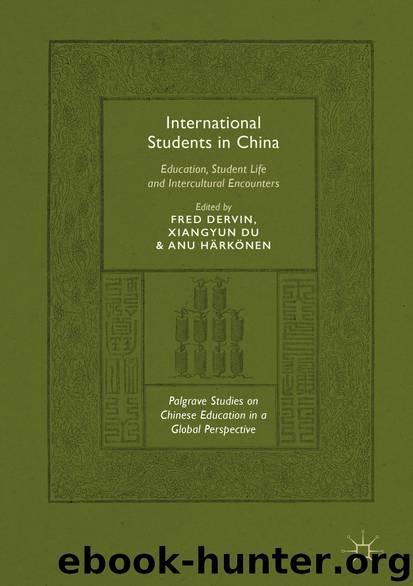International Students in China by Fred Dervin Xiangyun Du & Anu Härkönen

Author:Fred Dervin, Xiangyun Du & Anu Härkönen
Language: eng
Format: epub
Publisher: Springer International Publishing, Cham
Methodology and Method
In 2014 and early 2015, a qualitative study was undertaken in Beijing involving in-depth interviews with Australian students (n = 11): females (n = 5) and males (n = 6). These interviews explored how these students’ expectations compared with their lived experience after arriving and residing in Beijing. This study examined how the students made sense of, and negotiated their interactions with, their Chinese host society. The student-participants were (a) Australian nationals, (b) currently studying Chinese language at a university in Beijing, and (c) had been in China for at least six months prior to being interviewed. None of the 11 interviewees were Chinese-born and all were likely to be identified as laowai, that is, ‘foreigner’ by local Chinese.
At the time this research was undertaken, Beijing was the most popular study destination for international students, hosting 20 per cent of all international students within China, that is, more than any municipal city or province (Ministry of Education, 2016). Selecting students who had been in China for at least six months ensured that the research participants had been markedly immersed in the Chinese society, had sufficient time to assimilate, and were able to make sense of their lived experience there. The students’ level of Chinese language proficiency varied, with some having only basic Chinese, although three participants had enough proficiency to undertake undergraduate university courses in Chinese alongside local students.
An effective investigation of Australian students’ engagement with the foreign ‘other’ of China requires ‘conceptual and empirical attention to social contexts’ in which their study abroad experiences take place (Kimmel & Volet, 2012, p. 228). We apply the notion that Australian study abroad students arrive in China with embedded postcolonial and neoliberal ideologies, which position Eastern culture(s) as a foreign and exotic resource for Westerners to exploit for their personal and economic gain, such that ‘boundaries are temporarily crossed but ultimately reinforced’ (Desmond, 1999, p. 15).
Download
This site does not store any files on its server. We only index and link to content provided by other sites. Please contact the content providers to delete copyright contents if any and email us, we'll remove relevant links or contents immediately.
The Art of Coaching Workbook by Elena Aguilar(51160)
Trainspotting by Irvine Welsh(21641)
Twilight of the Idols With the Antichrist and Ecce Homo by Friedrich Nietzsche(18621)
Fangirl by Rainbow Rowell(9228)
Periodization Training for Sports by Tudor Bompa(8253)
Change Your Questions, Change Your Life by Marilee Adams(7758)
This Is How You Lose Her by Junot Diaz(6877)
Asking the Right Questions: A Guide to Critical Thinking by M. Neil Browne & Stuart M. Keeley(5757)
Grit by Angela Duckworth(5604)
Red Sparrow by Jason Matthews(5465)
Paper Towns by Green John(5177)
Room 212 by Kate Stewart(5105)
Ken Follett - World without end by Ken Follett(4723)
Housekeeping by Marilynne Robinson(4436)
The Sports Rules Book by Human Kinetics(4379)
Papillon (English) by Henri Charrière(4262)
Double Down (Diary of a Wimpy Kid Book 11) by Jeff Kinney(4261)
The Motorcycle Diaries by Ernesto Che Guevara(4089)
Exercise Technique Manual for Resistance Training by National Strength & Conditioning Association(4061)
